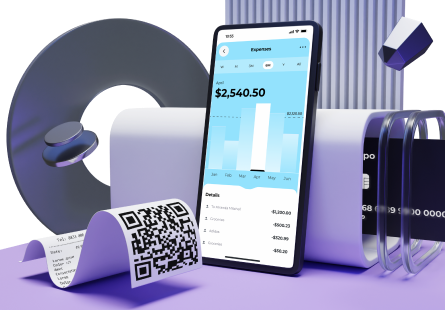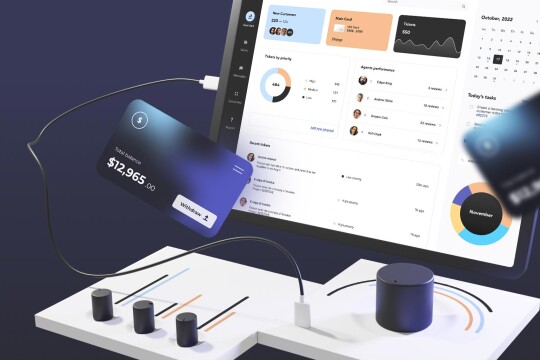The financial services industry is widely adopting new technologies to create innovative products that transform the way businesses and consumers manage their finances. Fintech product development is gaining traction; however, it’s often hard for startups to survive in the ever-evolving, competitive fintech market. The 2020 Google Cloud’s Fintech Focus Report indicates that only 6% of fintech startups manage to at least break even.
Another study, based on interviews with the founders of over 80 failed startup projects, explains the reasons for startup failures: lack of product-market fit, lack of expertise, and financial issues are the top three drivers of failure.
Why do fintech startups fail? Industry leaders’ opinions.
We conducted a series of interviews with fintech startup CEOs and founders from our network. The questions were, “Why do fintech startups fail? What are the most common mistakes?”. Let’s explore what they told us.
Mike Kessler, CEO at Tokenise
I think it is worth highlighting some of the following points:
1. Profits and cashflow are very different, there is a significant need to focus on cashflow as most startups fail because they run out of cash.
2. Ensure that you have worked out your cashflows and that you have adequate funding.
3. If you are looking to raise capital, be sensible with your valuation and don’t overvalue your business, you want to show a positive increase to investors based on further funding round if required.
4. Always assume that it will take far longer to get up and running and raise capital than you first envisaged.
Steve Round, Founder at SaaScada
There are many reasons for startups to fail:
- Not understand the real market need;
- Not researched the possible probable competitors;
- Taking time to understand the market and be prepared to refine the proposition;
- Not understanding can lead to a lack of focus which is key as is energy.
But in many cases, founders are not necessarily the best people to drive the business forward after launch.
Can I add the last one? The energy you use to deliver it can be immense – if it’s too much – when you launch, you have no energy left to drive it forward. End up like me – old and knackered 🙂
Thomas Park, Private Equity, Real Estate, and Blockchain Executive
Most financial startups fail because they are undercapitalized (not enough cash is raised initially), or they have a strategy that isn’t fully developed. They think that they have fixed a problem that clients want but lack the sophistication to understand or build enough trust to move a client to a new solution. For example, customers are willing to tolerate the really bad service of large banks for a period of time before they switched to a Fintech company.
Stuart Watkins, CEO at Zenoo.com
For some time there has been a buzz around for VC’s and founders in creating all sorts of Fintech businesses. Quite often the founders and VC’s have no to limited experience in running a regulated business. They are formed and evolve using “short cuts” across the board in funding, tech, procedures and staffing. They believe they can take on the traditional banking systems but doing things quicker, providing a more customer-centric solution and a digital approach to a still very much non-digital industry. What they fail to comprehend are the complexities of regulations and doing things in a proper way to protect the consumer and prevent organised crime from being able to trick the system. The result is often a much higher funding requirement or more shortcuts (at high costs). Inexperienced VC’s loose confidence and pull additional funding, founders lose drive, and they fail.
Patrick Leahy, Co-Founder at Elva, the Financial Wellness Company
I would say it’s crucial to select the right technology partner.
The team should be able to build robust solutions in a timely matter, have a vested interest in the product’s success and can be trusted to deliver with little oversight.
In this case, a Founder/CEO can focus on essential aspects like sales, strategy and communication with investors rather than on daily routine or micromanagement. Otherwise, the founder is overloaded, which leads to startup failure (sooner or later).
Key points of successful fintech product development
We’ve recognised the most common mistakes and figured out the main reasons why fintech startups fail, now let’s move on to questions that everyone is interested in: how can you protect your company from failure? What are the secrets of a successful fintech product?
1. Gather a team with a “can-do” attitude
Needless to say, it is essential to have a dedicated team that is 100% concentrated on your product and profoundly understands your business goals, your target audience, and your expectations of the final product.
But we would like to highlight the most important aspect, in our opinion – the enthusiastic approach and can-do attitude of the team.
What do we mean by that? Team members should have the desire to find out all the details concerning your project, think and analyze, make suggestions, ask questions, and are able to say “no” (when needed) and propose a better solution. They are ready to get things done ASAP and proactively respond to challenges and unexpected changes. In other words, they treat your product as if it were their own.
It goes without saying that you also should ensure the team’s stability (minimize the number of rotations).
2. Conduct a discovery phase
Many startups skip the discovery phase, making a deadly mistake. The discovery phase is critical for the project’s success since its primary goal is to eliminate financial risks and make the software development process as smooth as possible. The discovery phase entails research, analysis, exploration, and planning to define business goals, identify the project’s scope and timeline, determine the team composition, and estimate the budget.
For smooth and successful product development, it is essential that the discovery stage team stays on the project and proceeds with further engineering.
3. Set realistic goals
Analyzing your goals to make sure they are realistically achievable will help you maximize resources and increase your chances for success. Establish goals that are possible to reach with the current timeframe, budget, skills, and abilities. There is an acronym SMART used to guide goal setting. It stands for specific, measurable, achievable, realistic, and time-bound goals.
4. Do not overengineer
Overengineering can kill your product. That’s why your technical team must have enough experience and capability to strike a fine balance.
It is crucial to invest time in thinking through the product’s architecture, determine the list of required functionality and stick to it, avoiding extra and unnecessary capabilities. If you overengineer your solution with more components than it needs at each stage of development, you risk getting a cumbersome structure, significantly increasing development and maintenance costs and negatively impacting your time-to-market.
We would like to mention one more important point here: don’t expect your team to code all the time. It is crucial to allocate time to think, plan, brainstorm, make decisions, and come up with architecture. That’s the way great products are born.
5. Do not reinvent the wheel – make integrations
No matter how independent the fintech industry might seem, it depends on traditional banks and their complex infrastructure, making integrations in fintech product development virtually unavoidable. Fintech apps can be integrated with bank APIs to let users access their financial transactions history and other essential records. Integrations will save you both time and costs in the first place. In addition, they will help you deliver better experiences and more features to users, multiplying the chances of your fintech product meeting consumer expectations.
6. Do not save on product management
You can take a brilliant technical specialist and make him/her a terrible manager. Please don’t do that.
Fintech product development is a complex, multifaceted process. Efficient planning, organization, and monitoring are imperative to completing a project on time and within budget. It can be challenging for developers to simultaneously focus on product management and development, which makes the role of product managers in the fintech app development process vitally important. Fintech product management focuses on developing a solution that will positively affect business development.
A product manager sees the project from a business perspective and translates technical language into business terms, facilitating efficient communication and clear understanding between the development team and the fintech company. Engaging a product manager prevents time and cost overruns and helps guide the team toward achieving goals.
Unlike established companies, at startups, the product manager usually combines the roles of project manager, product owner and business analyst. As your product grows, consider assigning separate roles and also involving PM’s assistant (for routine tasks, documentation etc.)
7. Keep everything documented
Documentation is vital in fintech product development, and for fintech startups in particular. Properly written and maintained documentation details the project’s specific features and helps understand its functionality, making it crucial for the successful development of the MVP, attracting investment, negotiating with investors, and performing due diligence.
8. Do not underestimate the role of the CTO
For fintech companies, effective cooperation between the CTO and the team shouldn’t be underestimated. While the main scope of duties of startup CTOs and CTOs at established companies is the same – both are responsible for technological development – a startup CTO is focused more on fast growth rather than a long-term strategy.
A CTO creates and executes the plan, identifies the resources necessary to implement it and monitors the entire process from start to finish. They should keep the whole product architecture in mind (without diving deep into details) and be a connecting link between different project components.
As fintech startups are product-oriented institutions, CTO always has to keep the product in mind while making and prioritizing decisions. But as your resources are probably very limited, it means your CTO needs to make painful compromises and decisions every single day.
9. Track project status on a regular basis
To ensure the team understands your goals and expectations, and makes continual product development progress, it’s essential to keep tabs on the project at all times. Before signing the contract, make sure the team will provide timely and regular status reporting.
This may include:
- Weekly status calls;
- Daily catch-up calls;
- Demos of the developed functionality at the end of each sprint;
- On-time follow-ups on the required items to minimise stoppers to teamwork
It’s worth emphasising that for you as a CEO/founder, working in collaboration with the development team and taking an active part in all discussions, planning sessions, and stand-ups is crucial.
10. Design a good user experience
No matter what kind of financial services your product will help deliver to customers – digital banking, money transfers, insurance, or financial planning – these consumers will be the first to interact with the product. If they find your app frustrating, they won’t become your customers. In today’s intensely competitive fintech space, delivering the right user experience can be the difference between success and failure.
11. Gather feedback and learn from your customers
To make sure you are achieving business goals, it’s vital to collect and analyze user feedback before your app goes live. For this, you need to develop a minimum viable product (MVP) and deploy it to a specific group of end-users. Their feedback will help you test and improve the product’s quality and determine its acceptability and competitiveness in the market.
12. Gain initial traction to build investors’ trust
Gaining traction for startups suggests generating trust first of all. However, the days when investors paid for an idea are gone. A clearly established mission statement isn’t enough to show investors that the startup is dedicated and has a high chance to succeed. That said, presenting an MVP is the best way to attract investors and gain their trust in your product’s bright future. The primary goal of an MVP is to gain early traction, which is necessary for raising more considerable investments and building a fully-fledged product.
13. Make sure your product complies with all regulations
Please don’t underestimate the importance and volume of a lawyer’s work.
While developing solutions for the financial industry, it’s crucial to ensure they comply with governmental regulations. You need to understand all the existing restrictions, conditions, risks, and licenses. The best solution would be to hire a lawyer specialising in data privacy and security laws, with specific experience in IT and fintech. A lawyer with no IT experience (even if they have 30 years of experience in family law, for example) can do more harm than good.
As comprehensive legal services can be expensive, you can consider giving small equity (up to 2%) in your startup to a lawyer.
Parting thoughts
Financial technologies continuously evolve, allowing financial institutions that quickly adopt innovation to gain a competitive edge. However, developing innovative solutions requires a comprehensive approach, meaning you should focus on various aspects to succeed, including technology, regulations, effective product management, user needs and expectations. Fortunately, most of them boil down to selecting the right technology partner and gathering a team that already has the knowledge and experience to help you build a successful product.
Your primary goal as a startup Founder/CEO is to prevent yourself from burnout, not lose your drive, and stay motivated and energised for an extended period of time. Building a startup is an enduring marathon, not a quick sprint.







